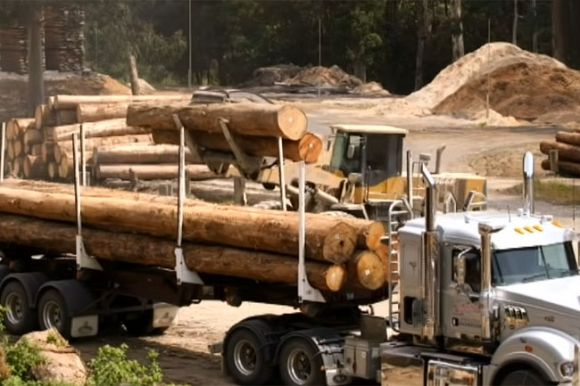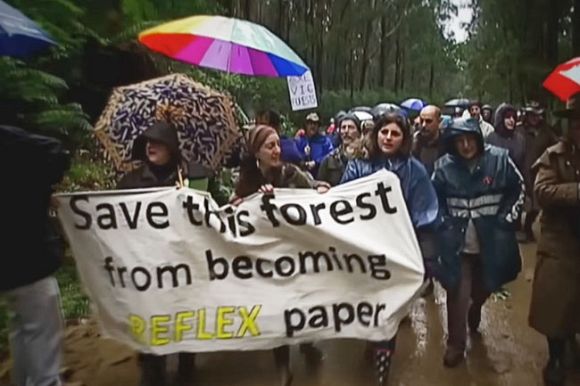With its environmental devastation and persistent dependency on disproven myths, the logging industry needs to be re-examined as a whole, Rosemary Sorensen writes.
AFTER DEBUNKING myth after myth disseminated by logging industries in his new book The Forest Wars, ecologist David Lindenmayer finally asks why an inefficient and destructive business is so difficult to stop.
To answer that, he quotes Ben Chifley:
'Always back the horse named self-interest.'
Like so many of the puzzling decisions made by successive governments in the face of facts that are irrefutable, the obstinate refusal to respond to the damage of self-interest, Lindenmayer says, protects a 'small number of people and organisations' fighting hard 'to keep their privileges'.
You’d think it has to be more than that, some kind of sociopathic loathing of both people and the natural world. The desire to get rich and richer at the expense of communities is grotesque enough — knowingly laying waste to the future is a grand kind of malevolence.
Read any account of settler destruction of the land they didn’t understand or value beyond its extractive potential and the dire mistakes are explicable, if not excusable. The violence, however, indicates something like manic rage fuelling the destruction.
Consider, for example, the nightmarish method where trees at the top of a wooded hill were felled to crash domino-like onto those down the slope until the entire hillside was laid waste.
Admirably, despite his long experience of how government agencies, unions and businesses lie to create the mythic basis for an unsustainable industry, Lindenmayer is still fighting to salvage what is left of the once-great forests of Australia, particularly the Mountain Ash and Alpine Ash of Victoria’s Central Highlands.
While he is clearly frustrated and disgusted by politicians who told him they’d stop old-growth logging and then reneged, he remains energetic and positive, outlining practical, clear, uncontroversial solutions.
Based at the Australian National University in Canberra, Lindenmayer is one of the dedicated environmental scientists this country ought to treasure and who really should be much better known than they are. He is the author of not just textbooks for student and expert use, but also many books about trees, his relaxed and pleasant writing style often accompanying beautiful photography.
Even when you’re taking in information, much of it distressing, he manages to write as though you’re in the room with him, listening to a really experienced friend help you understand the science and history, as well as the environmental and social ramifications.
For The Forest Wars, he’s divided the contents into 12 chapters, eight of which list the "myths" that forestry uses to claim legitimacy. One of those myths – that salvage logging in storm-damaged forests is necessary to prevent fire – ran as an ABC News story last year, where it was clear the journalist had been given the story, quotes and all, by VicForests — an organisation now defunct following revelations of some really nasty behaviours.
Written out of Central Victoria, the ABC story reported that this salvage logging was being undertaken in partnership with the Dja Dja Wurrung Clans Aboriginal Corporation. The cynicism of referencing Indigenous participation is evident when the facts about salvage logging are gathered.
Lindenmayer writes:
'The evidence… indicates that post-disturbance logging actually makes forests more flammable, not less.'
Many of the myths don’t use facts but rely instead on a deep-rooted stereotype of the rugged man alone battling heroically against an alien landscape.
As Lindenmayer argues, the 'longstanding reality' is that,
'large parts of the native forest logging industry in Australia are characterised by clear-felling extensive areas with machines to produce predominantly woodchips and paper pulp'.
Against all the misinformation used to slow down the inevitable cessation of native forest logging – inevitable because there soon won’t be any left to log – Lindenmayer calls for those outside government to do better in creating a vision for the future.
He’s given up on trying to get governments to do the right thing, not only because he and others have been the victims of aggressive tactics employed by the Victorian Government’s VicForest agency but also because 'Politicians are scared of a future they cannot see'.
Take a politician or a government bureaucrat into the remnant of a forest and show them what’s there and they might tut-tut and shake their heads and promise to do something. What happens next? The lobbyists swarming like locusts in the parliamentary corridors get to work and, lo and behold, the promise evaporates.
It took year after year of losses for VicForests to shut down — they blamed the cost of litigation as they attempted to defend destroying trees and habitats. Of the 140 staff impacted by the closure, 80 are moving to the Department of Energy, Environment and Climate Action.
The Age even reports that:
'Harvest contractors had been offered five-year agreements with Forest Fire Management Victoria.'
Uh oh.
No doubt the tireless campaigners against logging in places like the Wombat Forest near Daylesford in Central Victoria won’t be thinking their job is done, although there is cautious optimism that things will now be different. Lindenmayer talks about the huge task of restoration of forests degraded by clear-felling and salvage logging, and he also warns that what is now called 'cultural burning' is 'complex and highly varied in its application'.
At a Future Fire Forum run last week by the University of Melbourne’s Creswick campus near Daylesford, a presentation by the Uni’s Jack Pascoe and Dave Roberts from the Department of Energy, Environment and Climate Action (DEECA) was met by the attendees with enthusiasm, as the two men outlined the work being done with Indigenous fire management teams.
It was all about networking skills and resources, an idea also prominent in other presentations about the challenges and capabilities needed to face the increased incidence and ferocity of wildfire.
Roberts, in his government uniform, is always “philosophising” according to Pascoe — a Yuin man who researches at the non-profit Conservation Ecology Centre at Cape Otway and is now also a senior research fellow in the School of Ecosystem and Forest Sciences. The congenial banter between the two underlined how important they rate cooperative work and both men appear to have strong social and organisational skills. They certainly are impressive communicators.
At one point, there occurred a ripple of unease that disturbed the clear flow of their presentation as Roberts made a throwaway comment about the need for load-reduction burning, then chuckled and wondered if he was still allowed to talk about that.“This isn’t being recorded, is it?”
Hopefully, it is now time to debate such things without those with vested interests manipulating the information with lies and myths. Lindenmayer is as enthusiastic as Roberts about First Nations co-management and the development of 'elite fire-fighting crews to protect rural communities'. Like Roberts and Pascoe, he also wants to see cultural burns applied only to those ecosystems that benefit from them—'the right fire for the right Country'.
Meanwhile, however, Lindenmayer points out union support for 'flawed forestry activities such as forest gardening and salvage logging' — false claims about jobs and safety swing media and public opinion in favour of an unsustainable industry.
As so much evidence shows, it’s stupid and short-sighted to sustain the myths about large-scale industrial logging with the belief that it’s either/or — either human populations thrive or the forests do.
Lindenmayer’s list of things that can be done for a better future for both communities and forests is so straightforward it makes you wonder how anyone reading it can refuse its logic. Anyone who’s not sociopathic that is.
Rosemary Sorensen was a newspaper, books and arts journalist based in Melbourne, then Brisbane, before moving to regional Victoria, where she founded the Bendigo Writers Festival, which she directed for 13 years.
Related Articles
- War declared on logging industry
- Governments turning deaf ears on logging outrage
- Politicians persist in plundering the planet for profit
- Tasmanian Liberals’ ecocide
- Mark McGowan must stand tall on future promise to protect forests
 This work is licensed under a Creative Commons Attribution-NonCommercial-NoDerivs 3.0 Australia License
This work is licensed under a Creative Commons Attribution-NonCommercial-NoDerivs 3.0 Australia License
Support independent journalism Subscribe to IA.















